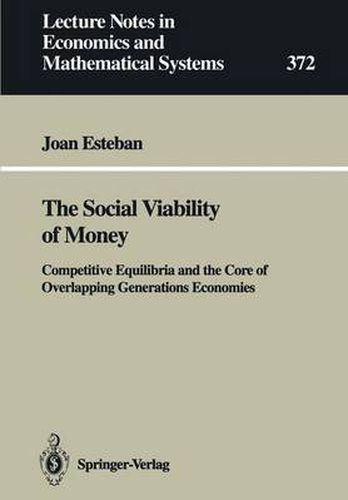Readings Newsletter
Become a Readings Member to make your shopping experience even easier.
Sign in or sign up for free!
You’re not far away from qualifying for FREE standard shipping within Australia
You’ve qualified for FREE standard shipping within Australia
The cart is loading…






This title is printed to order. This book may have been self-published. If so, we cannot guarantee the quality of the content. In the main most books will have gone through the editing process however some may not. We therefore suggest that you be aware of this before ordering this book. If in doubt check either the author or publisher’s details as we are unable to accept any returns unless they are faulty. Please contact us if you have any questions.
In this book overlapping generations economies are analysedfrom a game theoretical point of view and the socialacceptability of consumption allocations is studied ininfinite horizon models of pure exchange economieswithagents with finite lifetimes who behave cooperatively. Thecore of such economies and its relation with competitiveequilibria, both walrasian and monetary and the essentialcharacteristics of the overlapping generations model areexamined. The author defines the problem of trust in intertemporalconsumption allocations as a question of belonging or not tothe core of economy and provides a full characterization ofthe core allocations for n-goods pure exchange economieswith one agent per generation: a consumption allocationbelongs to the core if and only it is Pareto optimal andSequentially Individually Rational. From this it followsthat for one commodity economies no consumption allocationinvolving intertemporal transfers can belong to the core ofthe economy. In other words, no monetary equilibrium issocially viable. This result is no longer true for manygoods models. For that case it is demonstrated that thereexist bounds on the real value of equilibrium moneypurchases beyond which monetary equilibria are not sociallyviableand with many agents in every generation it is shownthat as the economy becomes large and monetary (as well asIOU) equilibria become eventually excluded from the core ofthe economy. These results provide an analytical rationalefor the fact that in most countries fiat money is legaltender.
$9.00 standard shipping within Australia
FREE standard shipping within Australia for orders over $100.00
Express & International shipping calculated at checkout
This title is printed to order. This book may have been self-published. If so, we cannot guarantee the quality of the content. In the main most books will have gone through the editing process however some may not. We therefore suggest that you be aware of this before ordering this book. If in doubt check either the author or publisher’s details as we are unable to accept any returns unless they are faulty. Please contact us if you have any questions.
In this book overlapping generations economies are analysedfrom a game theoretical point of view and the socialacceptability of consumption allocations is studied ininfinite horizon models of pure exchange economieswithagents with finite lifetimes who behave cooperatively. Thecore of such economies and its relation with competitiveequilibria, both walrasian and monetary and the essentialcharacteristics of the overlapping generations model areexamined. The author defines the problem of trust in intertemporalconsumption allocations as a question of belonging or not tothe core of economy and provides a full characterization ofthe core allocations for n-goods pure exchange economieswith one agent per generation: a consumption allocationbelongs to the core if and only it is Pareto optimal andSequentially Individually Rational. From this it followsthat for one commodity economies no consumption allocationinvolving intertemporal transfers can belong to the core ofthe economy. In other words, no monetary equilibrium issocially viable. This result is no longer true for manygoods models. For that case it is demonstrated that thereexist bounds on the real value of equilibrium moneypurchases beyond which monetary equilibria are not sociallyviableand with many agents in every generation it is shownthat as the economy becomes large and monetary (as well asIOU) equilibria become eventually excluded from the core ofthe economy. These results provide an analytical rationalefor the fact that in most countries fiat money is legaltender.